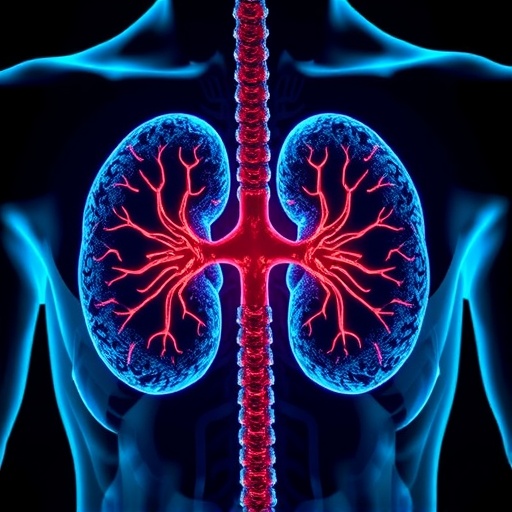In a groundbreaking stride toward combating renal cell carcinoma (RCC), recent research has illuminated the potential of berbamine (BBM), a natural compound known for its anti-inflammatory and anti-cancer properties, in restraining the proliferation and invasion of RCC cells. Published in BMC Cancer, this study elucidates how BBM orchestrates its anti-tumor effects by elevating the expression of the fat mass and obesity-associated gene (FTO), heralding a promising avenue for the development of novel therapeutics against metastatic RCC.
Renal cell carcinoma remains one of the most challenging malignancies affecting the kidney, notorious for its resistance to conventional therapies and a high tendency for metastasis. The urgent search for efficacious and less toxic treatment regimens has led scientists to explore phytochemicals like berbamine, a compound derived from the traditional Chinese medicinal plant Berberis amurensis. Despite its historical use, the mechanisms by which BBM impedes RCC progression had hitherto remained obscure.
In the current study, researchers focused on two human RCC cell lines, 786-O and OSRC2, to rigorously investigate BBM’s capacity to influence cancer cell behavior. They employed a battery of functional assays to assess changes in cell proliferation, colony formation, cell cycle progression, migration, and invasive potential. These experiments were complemented by in vivo tumorigenesis models designed to evaluate BBM’s anti-tumor efficacy and systemic toxicity.
Remarkably, BBM demonstrated a robust, dose-dependent inhibition of RCC cell proliferation. The compound not only suppressed colony formation ability but also disrupted cell cycle progression, indicating a comprehensive blockade of tumor growth machinery. Functionally, BBM impaired the migratory and invasive phenotypes of the RCC cells, suggesting its potential to thwart metastatic dissemination, a leading cause of RCC mortality.
Moving beyond phenotypic observations, the study delved into molecular underpinnings, unveiling that BBM significantly augments the expression of FTO at both mRNA and protein levels. FTO, widely recognized for its role as an RNA demethylase impacting epitranscriptomic regulation, has recently garnered attention as a tumor suppressor in certain cancers. The enhancement of FTO by BBM posits a direct molecular pathway through which this natural compound exerts its anti-cancer effects.
Crucially, the authors demonstrated that silencing FTO using siRNA attenuated BBM’s inhibitory action on RCC cells’ growth and invasion. This pivotal finding establishes FTO as a necessary mediator of BBM’s anti-tumor activity, positioning the FTO pathway as an attractive target for therapeutic intervention. Such mechanistic insight underscores the potential for targeted epitranscriptomic modulation in cancer therapy.
In vivo studies further reinforced these findings, with BBM administration leading to significant suppression of tumor growth in animal models. Importantly, this was achieved without apparent toxicity to vital organs, addressing a major limitation of many chemotherapeutic agents that inflict severe systemic side effects. The favorable safety profile of BBM amplifies its promise as a candidate for clinical development.
The study’s multi-tiered approach — combining cellular assays, molecular biology techniques, and animal models — provides a robust foundation for understanding berbamine’s anti-cancer mechanisms. It also opens the door for further exploration into how FTO modulates downstream targets relevant to RCC progression and metastasis, which remain to be clarified for comprehensive therapeutic exploitation.
While berbamine’s utility in cancer has been previously hinted at, this research distinctly maps its influence within the RCC microenvironment, highlighting the integration of epitranscriptomic regulation into tumor biology frameworks. The identification of BBM as an FTO enhancer enriches the repertoire of epigenetic and epitranscriptomic modulators being investigated for cancer treatment.
The implications of these findings are especially significant in the context of metastatic RCC, where current therapeutic options are limited and often fraught with resistance. BBM’s dual capacity to inhibit proliferation and invasion addresses critical aspects of tumor aggressiveness and spread, which are paramount concerns in patient prognosis.
Moreover, the study’s revelation that FTO acts as a tumor suppressor in RCC contrasts with its oncogenic roles in other cancers, highlighting the complex, context-dependent functions of epitranscriptomic regulators. This duality underscores the necessity of precision medicine approaches tailoring therapy based on tumor-specific molecular landscapes.
Future research is warranted to characterize the direct targets of FTO in RCC cells influenced by BBM treatment. Understanding the epitranscriptomic alterations may unveil novel biomarkers for treatment response and identify combinatory strategies to enhance therapeutic efficacy.
Given berbamine’s natural origin and apparent low toxicity, translational efforts could expedite its progression into clinical trials. The prospect of integrating such a compound into RCC treatment regimens offers hope for improved outcomes through innovative, biologically inspired therapies.
In sum, this pioneering study not only delineates a novel mechanism by which berbamine hampers RCC progression by harnessing FTO expression but also enriches our conceptual framework of cancer biology, emphasizing epitranscriptomic modulation as a frontier in oncology. The therapeutic promise of BBM could catalyze a paradigm shift in combating metastatic renal cell carcinoma, fulfilling a critical unmet medical need.
Subject of Research:
The investigation focuses on the anti-tumor effects of berbamine in renal cell carcinoma cells and its molecular mechanism involving the upregulation of the fat mass and obesity-associated gene (FTO).
Article Title:
Berbamine inhibits cell proliferation and invasion by increasing FTO expression in renal cell carcinoma cells
Article References:
Xu, J., Cheng, X., Xu, M. et al. Berbamine inhibits cell proliferation and invasion by increasing FTO expression in renal cell carcinoma cells. BMC Cancer 25, 987 (2025). https://doi.org/10.1186/s12885-025-13463-y
Image Credits:
Scienmag.com




